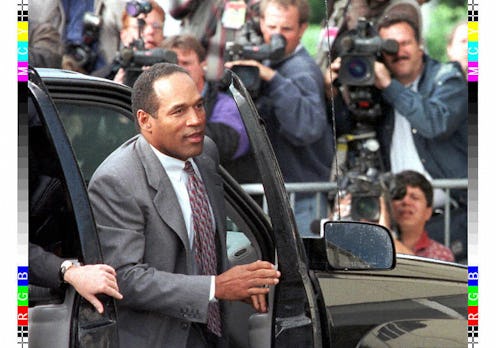Entertainment
Here's What Sets 'O.J.: Made In America' Apart
When I first heard about the June 11 premiere of the ESPN series O.J.: Made In America , my initial response was that, as much as the case fascinates me, it was a little soon for another Simpson-focused series. After all, many of us just finished watching Ryan Murphy's The People v. O.J. Simpson: American Crime Story, which was an amazing and intense look at the behind-the-scenes details of the trial of the century. But, it's clear from the 90-minute premiere episode that O.J.: Made In America will focus on more than the murder trial that ended with Simpson being found not guilty of the murders of Nicole Brown Simpson and Ron Goldman.
Plenty of American Crime Story viewers were born in the late '80s and early '90s and, as a result, we don't have clear memories of what it was like to watch the actual trial unfold. Although I've always known the basics of the case, I learned a whole lot about it by watching Murphy's series and immediately Googling details to find out if they were accurate. But, I still didn't quite understand the magnitude of Simpson's rise to fame or the development of his public persona — and those things undoubtedly played a huge role during the trial and the media circus that surrounded it.
That's where Made In America comes in, because it provides viewers with a wealth of contextual information about Simpson before we reach the trial itself.
At the beginning of the premiere episode, we hear Simpson describe what he dreamed of as a child growing up in poverty — he didn't just want to be rich, he wanted to be famous as well. When he arrived at USC on an athletic scholarship in 1967, Simpson saw the chance to make that happen and he seized it. As the documentary explains, USC was a powerful institution that had influence in industries from Hollywood to law to banking — and its success hinged on the football team. Simpson's mere presence on the campus during the '60s was out of the ordinary, because many students had never even interacted with a black person.
Simpson's childhood friend Joe Bell describes him as becoming "seduced by white society" when he arrived at USC. In an era where racism was rampant, Simpson seemed to transcend race almost immediately — he quickly achieved celebrity status on campus and guest speakers jokingly referred to it as "O.J. University." And, Simpson's famous touchdown run and Heisman Trophy Award made him a national star by the time he was 21. The wealth of archive footage used in Made In America is interesting. In footage from his years at USC and as a member of the Buffalo Bills, Simpson comes off as charismatic and humble.
As the premiere shows, he crossed racial barriers in a way that no athlete ever had before. Both white and black people admired him, but Simpson reached a point where he allegedly told a friend, "I'm not black. I'm O.J." Clearly, he's not the only person who felt that way. In an unprecedented move at the time, Chevrolet chose him to be their spokesperson and Hertz tapped him to star in their commercials. However, the series points out that there couldn't even be black people as extras in the commercials. Advertisers thought their O.J. strategy would only work if no other black people were on the screen.
As he reached the height of his fame in the premiere, America saw Simpson as the opposite of the "angry black athlete" stereotype — so, given all this context, it makes more sense that there was such a high level of shock and fascination when Simpson was eventually charged with murder. It simply didn't match his public persona and the mere idea that a person who epitomized the American Dream would throw it away by committing murder surely came as a huge shock to the country. (Simpson was, of course, ultimately acquitted although he was found "liable" for the deaths of Brown Simpson and Goldman in a civil suit filed by their families.)
Towards the end of the episode, a 1970s-era Simpson speaks of his desire for recognition: "When I walk down the street, I want people to know me." All these years later, he remains one of the most famous people in America — but, as we all know now, the nature of Simpson's fame took an unexpected turn in 1994.
